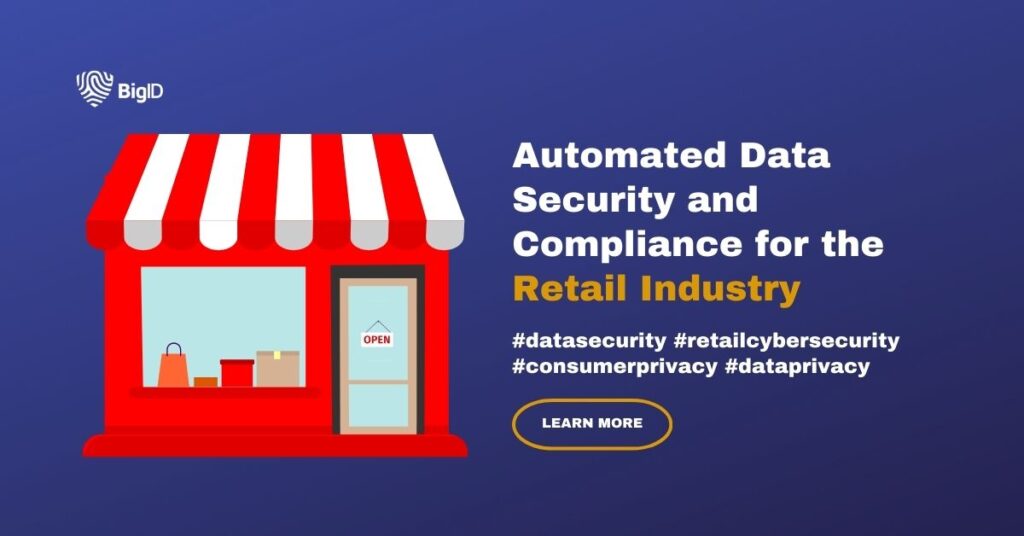Wären Daten eine Goldmine, wäre der Einzelhandel die lukrativste Branche. Einzelhändler sammeln, verarbeiten und speichern immer größere Mengen an Kundendaten, hauptsächlich persönlich identifizierbare Informationen (PII) und Zahlungskartendaten. Darüber hinaus agieren viele Einzelhandelsunternehmen in hybriden Umgebungen zwischen E-Commerce und stationärem Handel. Dies zwingt Einzelhändler dazu, Herausforderungen wie unzusammenhängende Ökosysteme, hybride Arbeit, Cloud-basierte Online-Erlebnisse und IoT-Technologien zu bewältigen. Die Zukunft des Einzelhandels ist zwangsläufig digital, hybrid und komplex und schafft zahlreiche Cybersicherheitsrisiken.
Im Laufe der Jahre haben Supermärkte und große Einzelhändler kontaktlose Zahlungsmethoden und digitale Kaufoptionen eingeführt. Dadurch vergrößerten sich ihre Angriffsflächen und der Schutz von Kundendaten wurde erschwert. Darüber hinaus hinterlassen Cloud-basierte Speicher und mobile Apps Datenreste im Internet, was zu Datenlecks und neuen Bedrohungsvektoren führt.
Warum Einzelhändler eine datenzentrierte Sicherheitsstrategie brauchen
Nach Angaben von IBM-Bericht zu den Kosten von Datenschutzverletzungen im Jahr 2023Die durchschnittlichen Kosten eines Datenlecks im Einzelhandel beliefen sich auf $2,96 Millionen. Der Einzelhandel ist besonders wegen seiner Zahlungskartendaten im Visier: Laut der Untersuchungsbericht zum Verizon-Datenleck. Der Einzelhandel muss seine Cybersicherheitsstrategie weiterentwickeln, da er weiterhin ein Hybridmodell nutzt, um seine einzigartigen Datenherausforderungen zu bewältigen.
Neben dem Schutz vor Cyberangriffen müssen Einzelhändler zunehmende Datenschutz- und Regulierungsanforderungen erfüllen:
- Datensicherheitsstandard der Zahlungskartenbranche (PCI DSS): Dieser Standard gilt für alle Einzelhändler, die Kreditkarteninformationen verarbeiten, speichern oder übermitteln, und erfordert robuste Sicherheitsmaßnahmen zum Schutz der Karteninhaberdaten.
- Gesetz zur Portabilität und Rechenschaftspflicht von Krankenversicherungen (HIPAA): Dies ist für Einzelhändler relevant, die mit geschützten Gesundheitsinformationen (PHI) umgehen, insbesondere im Apothekenbetrieb, der Maßnahmen zum Schutz von PHI und zur Gewährleistung der Einhaltung des Datenschutzes erfordert.
- Vorschriften der Federal Trade Commission (FTC): Die FTC setzt die Verbraucherschutzgesetze in den USA durch. Einzelhändler müssen die Vorschriften zu Werbung, Marketingpraktiken und Verbraucherdatenschutz einhalten, beispielsweise die Meldepflicht für Cybersicherheitsvorfälle gegenüber der SEC.
- Der Gramm-Leach-Bliley Act (GLBA): Gilt für Einzelhändler, die Finanzunterlagen mit personenbezogenen Daten erfassen, speichern und verwenden.
- Gesetz zum Schutz der Online-Privatsphäre von Kindern (COPPA): Dieses Gesetz regelt die Erfassung personenbezogener Daten von Kindern unter 13 Jahren in den Vereinigten Staaten und erfordert die Zustimmung der Eltern sowie Transparenz hinsichtlich der Datenpraktiken.
- Datenschutzbestimmungen: Datenschutz- und Schutzgesetze wie die EU Allgemeine Datenschutzverordnung (GDPR) und die Kalifornisches Verbraucherschutzgesetz (CCPA) erfordern die Einhaltung mehrerer Datenverwaltungsanforderungen.

Herausforderungen der Datensicherheit im Einzelhandel
Der Einzelhandel ist eine einzigartige Branche, die sich deutlich von den meisten anderen Branchen unterscheidet. Einzelhändler müssen bei der Entwicklung eines Cybersicherheitsrahmens verschiedene Faktoren berücksichtigen, um sich besser vor Datenschutzverletzungen und Cyberkriminellen zu schützen. Die Branche steht vor verschiedenen Herausforderungen:
Eingeschränkte Sichtbarkeit
Daten bilden die Grundlage von IT-Umgebungen und verbinden Benutzer, Anwendungen und Geräte. Aufgrund ihrer weit verteilten, großen und komplexen IT-Landschaft verfügen Einzelhändler jedoch nicht immer über die nötigen Tools, um Einblick in alle ihre Datenbestände zu erhalten. Dies ist ein entscheidender Schritt, um Cyberangriffe zu verhindern und die Einhaltung von Vorschriften zu gewährleisten, denn man kann nicht schützen, was man nicht sieht. Es gibt mehrere blinde Flecken, die die Angriffsfläche sichern, insbesondere beim Umgang mit Dark Data und Shadow Data.
Omnichannel-Bedrohungen
Einzelhändler haben die Digitalisierung beschleunigt, vor allem durch Betriebstechnologien wie Webshops, Lager, Sortiermaschinen, Kassen, digitale Zahlungssysteme, IoT-Geräte usw. Darüber hinaus müssen Einzelhändler große und komplexe IT-Landschaften absichern, darunter Netzwerke, Cloud-Dienste, Kassensysteme, Vertriebszentren und die Kommunikation mit Lieferanten in verschiedenen Filialen. Einzelhändler nutzen Omnichannel-Strategien, um ein einheitliches Ökosystem für Verbraucher und Lieferanten zu schaffen. Dies bietet jedoch Cyberkriminellen zahlreiche Möglichkeiten, Informationen zu stehlen und Schwachstellen auszunutzen. Einzelhändler sollten Überwachen Sie Ihre Daten regelmäßig auf ungewöhnliche Aktivitäten oder unbefugten Zugriff.
Diebstahl von Verbraucherdaten
Die Digitalisierungsstrategie des Einzelhandels führt dazu, dass Millionen von Kunden im stationären und Online-Handel immer häufiger mit Karte einkaufen. Dies erleichtert zwar den Handel und die Verbraucher, öffnet aber auch Cyberkriminellen Tür und Tor, da Einzelhändler Kundendaten (persönliche Informationen, Adressen, Transaktionen und Finanzunterlagen) speichern. Ransomware- und Phishing-Angriffe haben zugenommen, da Cyberkriminelle den Einzelhandel ins Visier genommen haben. Um vertrauliche Kundendaten zu schützen, können Einzelhändler durch die Einhaltung von Cybersicherheitsmaßnahmen finanzielle Verluste vermeiden.
Angriffe von Drittanbietern
Das Risiko eines Cyberangriffs durch Dritte im Einzelhandel steigt aufgrund der Vernetzung externer Lieferanten, Drittanbieter und Partner kontinuierlich an. Diese Geschäftsbeziehungen können Cybersicherheitsrisiken bergen. Angriffe auf die Lieferkette bieten Cyberkriminellen die Möglichkeit, mehrere Unternehmen über einen einzigen Lieferanten anzugreifen. Der Schutz vernetzter Systeme ist notwendig, um Lieferkettenunterbrechungen, Cyberangriffe und unbefugten Zugriff auf vertrauliche Informationen zu verhindern. Es ist wichtig, robuste datenzentrierte Sicherheitsmaßnahmen zu implementieren, beispielsweise ein Zero-Trust-Modell.
Umsatzverlust und Reputationsschäden
Es gibt deutlich erkennbare Muster in der Reaktion von Verbrauchern nach einem Sicherheitsverstoß gegen ein Unternehmen. Laut einer IDC-Studie „wechseln 801 bis 30 Prozent der Verbraucher in Industrieländern von einem Unternehmen ab, weil ihre personenbezogenen Daten von einer Sicherheitsverletzung betroffen sind.“ Vertrauen schafft Vertrauen, doch bei mangelnder Cybersicherheit laufen Einzelhändler Gefahr, finanzielle Verluste und Reputationsschäden zu erleiden.
Wie BigID Einzelhandelskunden dabei half, Datenschutz und Sicherheit zu automatisieren und kritische Daten zu verwalten
Einzelhandelsriese modernisiert Datenermittlung und -klassifizierung
Einzelhandelsriese wählt BigID zur Unterstützung CCPA/CPRA/ PIPL Einhaltung, erfüllen DSAR Anfragen bearbeiten und sensible Daten für über 100 Millionen Kunden und Mitarbeiter in den USA und China besser verwalten. Diese Zusammenarbeit optimierte die Einhaltung des Datenschutzes, senkte Kosten, erfüllte Datenzugriffsrechte effizient und verbesserte das Datenlebenszyklusmanagement.
Globale Einzelhandelsmarke beschleunigt Compliance und reduziert Insiderrisiken
Ein globaler Einzelhandels- und Fertigungskonzern nutzt BigID, um alle sensiblen, kritischen und personenbezogenen Daten in komplexen Umgebungen zu finden, zu ermitteln und zu klassifizieren. Dies unterstützt sichere M&A-Aktivitäten, verbessert globale Compliance-Audits und bietet einen „Privacy-First“-Ansatz zur Beschleunigung von Datenverwaltungs- und Sicherheitsinitiativen.
Wie BigID Einzelhändlern hilft, Daten zu schützen und Compliance zu erreichen
Einzelhändler benötigen einen datenzentrierten, risikobewussten Sicherheitsansatz, um ihre wichtigsten Daten zu schützen. BigID kombiniert Branchenexpertise mit fortschrittlicher Technologie, Datensicherheit und Analytik, um regulatorische Abläufe zu transformieren, Wachstum zu fördern und gleichzeitig die Compliance zu gewährleisten. BigID ermöglicht Einzelhändlern vollständige Transparenz und Einblicke in kritische Geschäftsdaten, das Risikomanagement, die Behebung von Datenschwachstellen, die Durchsetzung von Sicherheitsrichtlinien, die Sicherung von Daten und die Einhaltung gesetzlicher Anforderungen.
Mit dem Security-by-Design-Ansatz von BigID können Einzelhändler:
- Entdecken Sie Ihre Daten: Entdecken und katalogisieren Sie Ihre sensiblen Daten, einschließlich strukturierter, halbstrukturierter und unstrukturierter Daten – in lokalen Umgebungen und in der gesamten Cloud.
- Kennen Sie Ihre Daten: Automatisches Klassifizieren, Kategorisieren, Markieren und Kennzeichnen sensibler Daten mit unübertroffener Genauigkeit, Granularität und Skalierbarkeit.
- Verbesserung der Datensicherheitslage: Priorisieren und bekämpfen Sie Datenrisiken proaktiv und Automatisieren Sie das Data Security Posture Management (DSPM).
- Bereinigen Sie Daten auf Ihre Weise: Verwalten Sie die Datenbereinigung und delegieren Sie sie an Stakeholder, öffnen Sie Tickets oder tätigen Sie API-Aufrufe über Ihren gesamten Tech-Stack.
- Aktivieren Sie Zero Trust: Reduzieren Sie überprivilegierte Zugriffe und übermäßig exponierte Daten und optimieren Sie die Verwaltung der Zugriffsrechte, um Zero Trust zu ermöglichen.
- Minderung des Insider-Risikos: Proaktive Überwachung, Erkennung und Reaktion auf unbefugte interne Offenlegung, Nutzung und verdächtige Aktivitäten im Zusammenhang mit sensiblen Daten.
- Reduzieren Sie Ihre Angriffsfläche: Verkleinern Sie die Angriffsfläche, indem Sie unnötige, nicht geschäftskritische sensible Daten proaktiv beseitigen.
- Sichern Sie Ihre Cloud-Migration: Optimieren Sie die Cloud-Migration mit datengesteuerten Einblicken und Compliance, reduzieren Sie automatisch redundante Daten und verschieben Sie die Daten, die am wichtigsten sind.
- Optimieren Sie die Reaktion auf Datenschutzverletzungen: Erkennen und untersuchen Sie die Auswirkungen von Sicherheitsverletzungen schnell und präzise, ermöglichen Sie eine sofortige Reaktion auf Vorfälle und benachrichtigen Sie die zuständigen Behörden sowie die betroffenen Studenten und Mitarbeiter.
- Beschleunigen Sie die KI-Sicherheit: BigID erstellt effizient Richtlinien zur KI-Steuerung basierend auf Datenschutz, Sensibilität, Regulierung und Zugriff, um die mit LLMs und KI-Anwendungen geteilten Daten zu kontrollieren. Nutzen Sie KI mit verantwortungsvollen Schutzmaßnahmen, um vertrauliche Informationen und Studentendaten zu verwalten und zu schützen.
- Compliance erreichen: Automatisieren Sie die Compliance mit durchgängigen Datenschutz- und Sicherheitsfunktionen und -Frameworks, um persönliche, sensible und regulierte Daten zu schützen.
Vereinbaren Sie ein Einzelgespräch mit einem unserer Datensicherheitsexperten.


